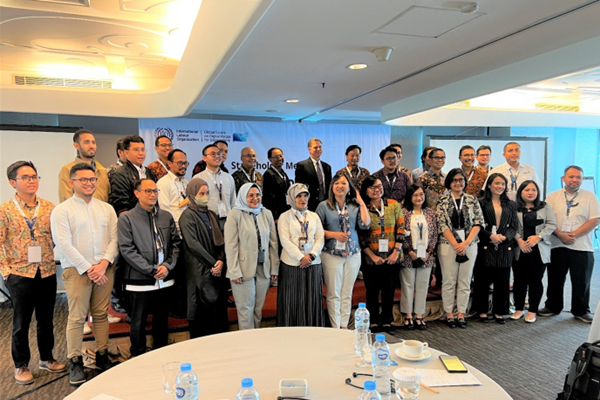Contact us: digitalwages@ilo.org
Stakeholder meeting on responsible digital wage payments for SMEs in Indonesia

On 6 March 2023, the ILO’s Global Centre on Digital Wages for Decent Work, in collaboration with the Central Bank of Indonesia and the Indonesian Employers’ Association (APINDO), hosted a stakeholder meeting on promoting responsible digital wage payments for small and medium enterprises (SMEs).
The meeting was attended by 38 representatives from the Indonesian government, employers’ organizations, trade unions, financial service providers, payroll service providers, and other development partners. Participants discussed the Global Centre’s action plan for Indonesia, gathered insights and ideas, and explored ways to work together to implement the proposed activities.
APINDO highlighted the importance of capacity building to the onboarding of SMEs and workers
Mr. Arief Budiman, Head of the SME Entrepreneurship Committee of APINDO, explained that SMEs are the largest providers of employment in Indonesia, but still face challenges in terms of formalisation and transition to digital wage payments. Digitisation is increasingly used for marketing and e-commerce, but internal business processes such as human resources and finance remain largely manual. APINDO’s member SMEs need solutions and support to fully understand and benefit from the potential of the digital economy. APINDO has invested in technical assistance initiatives to empower SMEs and their workers by improving their digital and financial capabilities.
According to Mr. Budiman, responsible digital wage payments have great potential to accelerate access to financial services, including payments, savings, investments and insurance. From APINDO’s perspective, the digitisation of wages is crucial for the financial wellbeing of workers. For example, it strengthens workers’ financial and credit records, enables more efficient transactions, and better financial management, and thus increases access to a wider range of financial services. APINDO welcomed the Global Centre’s initiative and is ready to further collaborate to strengthen workers’ financial wellbeing.
Bank Indonesia noted that the enabling digital and financial infrastructure is expanding
Dr. Arlyana Abubakar, representative of the Bank of Indonesia DKI Jakarta, commented on the positive impact of the digital economy, noting that it is changing consumption patterns, and that the adoption of new technologies by merchants is driving optimism for its development in Indonesia. Dr. Abubakar pointed that the infrastructure and ecosystem of digital payments play an important role in the transition to responsible digital wages.
Currently, the Indonesia Payment System Blueprint has strengthened digital payment methods, such as QRIS, allowing for the growth and greater penetration of their use in the country. Changes in consumer behaviour, increasing acceptance of digital payments by merchants, and a new and more consumer-centric business model are factors that have encouraged digital payment providers to consolidate and expand. As a financial regulator, the Bank Indonesia’s role is to strike the right balance between innovation and risk.
Participants concluded that synergies among ILO constituents and regional stakeholders should be encouraged
In the final part of the stakeholder meeting, the Global Centre engaged participants in a discussion on how their institutions could help accelerate the transition to responsible digital wage payments in Indonesia. Participants responded positively to the Global Centre’s proposed initiatives in the country, considering that the existing digital and financial infrastructure should be complemented by the capacity building for SMEs and workers on the path to responsible digital wages. Participants also noted the importance of fostering collaboration among key stakeholders at the national and regional levels, such as the Regional Financial Access Acceleration Teams.
